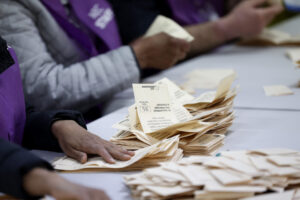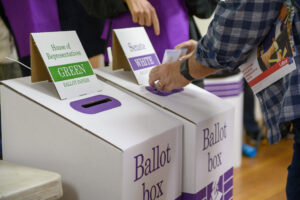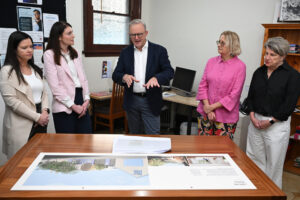Election entrée: Early voting in Australia

Share
A cornerstone of the Australian election experience is tucking into a democracy sausage after casting your ballot on election day.
But in recent years more and more Australians have abandoned voting on polling day, missing out on sausage sandwiches and – more importantly – the final days of the election campaign.

There are six categories of voting in Australian elections:
- Ordinary polling day: a vote cast in the voter’s home electorate on the day
- Absent: a vote cast outside of the voter’s home electorate (but in the same state or territory) on the day
- Ordinary pre-poll: a vote cast in the weeks leading up to polling day, and without a specific reason for doing so.
- Declaration pre-poll votes: a vote cast in the weeks leading up to polling day, and with the voter having a specific reason for doing so (such as being unable to vote on polling day, serious illness, or religious reasons).
- Postal votes: a vote issued, and generally returned, by mail (requires a reason like declaration pre-poll votes).
- Provisional: a vote cast where a voter’s name cannot be found on the roll, is already marked off, or by a silent elector. They make up a very small share of the vote (0.3% in 2022), so have not been included in Figure 1.
Prior to 2010, pre-poll votes all required a declaration with a specific reason that the voter could not cast their ballot on polling day. From 2010 onwards pre-poll voters have not needed to provide a reason. That has coincided with a dramatic rise in early voting: half of all votes cast at the 2022 election were filled in before polling day.
Pre-poll voting opens a little later in the 2025 election than it did in 2022 – 11 days rather than 12. In 2019, Pre-poll voting was open a full 19 days before election day. While pre-poll voting increased despite the shorter window in 2022, time will tell if that will happen again.
It can be more convenient for someone to vote according to their own schedule rather than on a specific Saturday. However, individual convenience may be hampering Australians’ collective democracy.
A key aspect of an election campaign is hearing the parties’ full list of policies, seeing how their leaders perform under the stresses of a long campaign, and then coming together as a country to make a choice about who should represent Australians in the next parliament. As more and more Australians vote early, are they really coming together?
Early voting can have real political consequences too, when issues surface late in an election cycle. At last year’s Queensland election, Labor lost government with a 7.0% swing against them – taking only 46.2% of the two-party-preferred vote. However, Labor narrowly won votes cast on election day itself with 50.6% two-party-preferred. To some extent, this reflects that early voters are generally more conservative than the electorate as a whole. However, it is also the case that those who voted on the day would have seen more of the election campaign than other voters – particularly on the question of abortion rights in the case of the recent Queensland election.
When voters go into the polling booth, they should do so with the knowledge that they’re making a choice, part of a decision that all Australians are making. Is that really the case if most of that choice has already been made?
Between the Lines Newsletter
The biggest stories and the best analysis from the team at the Australia Institute, delivered to your inbox every fortnight.
You might also like
Full preferential voting means you can’t waste your vote
Full preferential voting is a proud Coalition reform – one that benefits every political persuasion Compulsory voting and full preferential voting make up the backbone of Australian democracy, and protect us from voter suppression and disengagement seen in other countries. We owe both to the parties of the centre-right, what would become the Liberal–National Coalition.
The rise of early voting in Australian elections
Are voters missing out on more than their democracy sausage?
Election entrée: think three-year terms are too short? Spare a thought for generations past.
Complaints about the brevity of three-year parliamentary terms are common in Australia.



